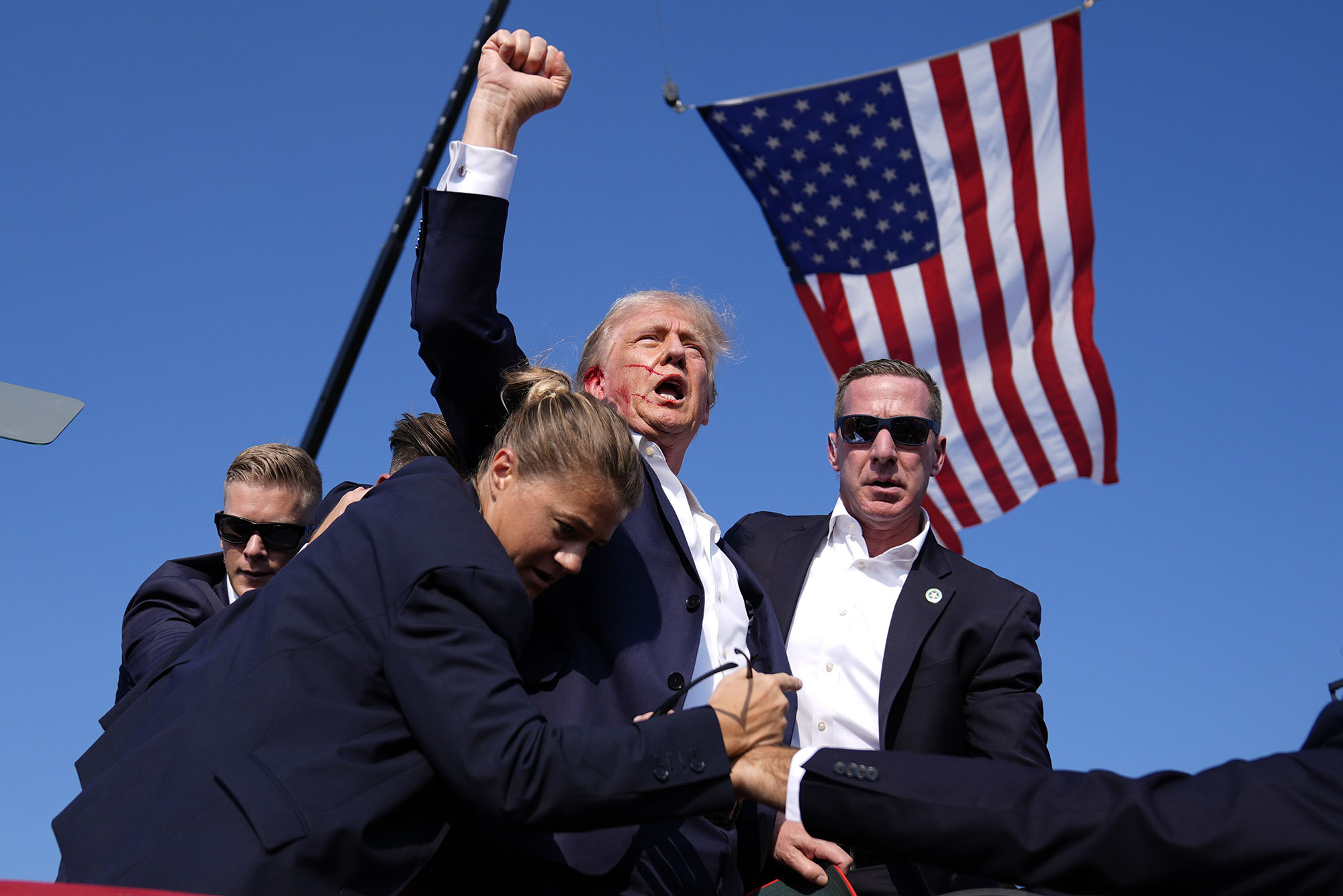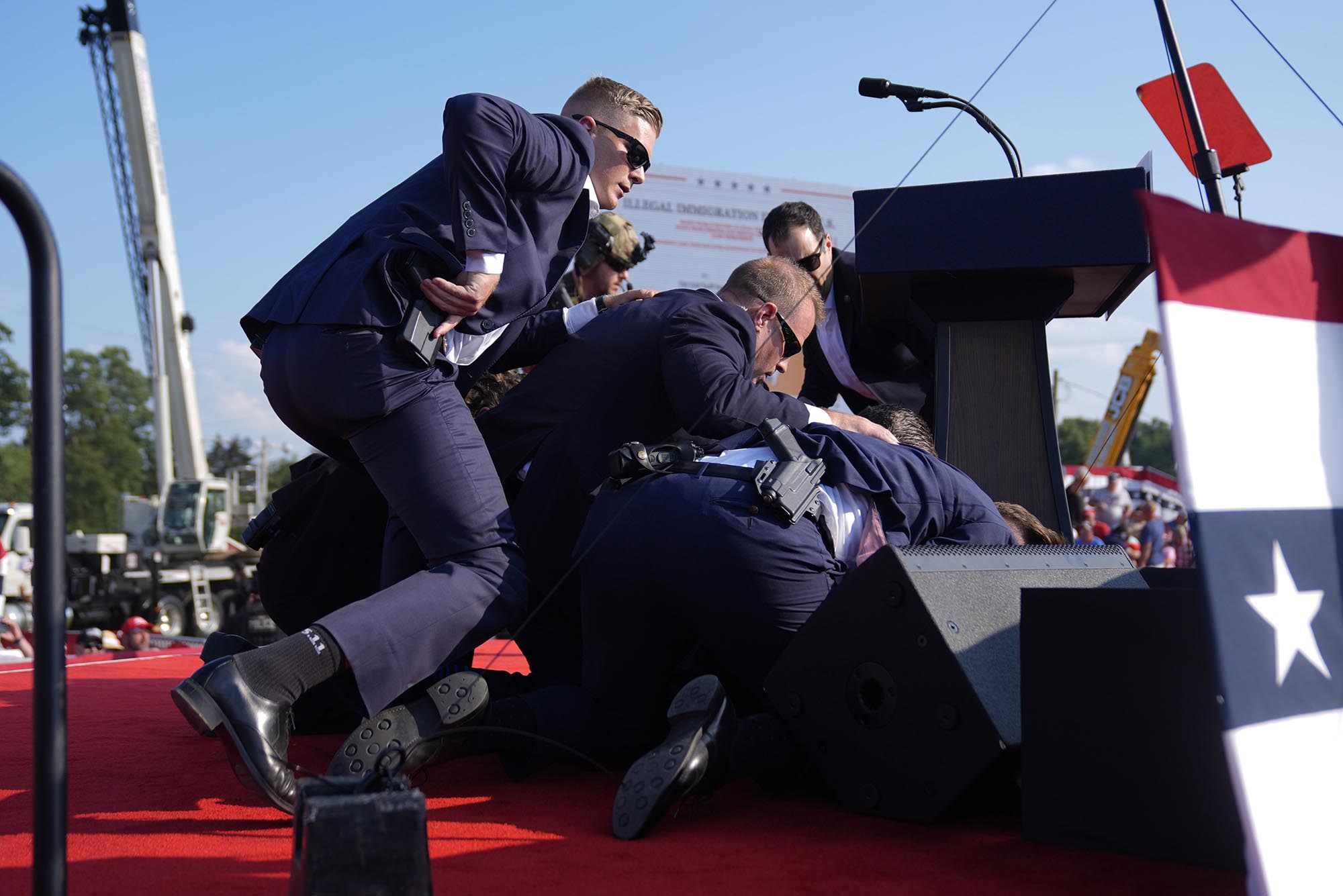Trump Survived an Assassination Attempt. Will Our Politics?
BU political scientist, expert in political violence, says the tone from both sides matters

Republican presidential candidate former president Donald Trump surrounded by U.S. Secret Service agents after gunfire at a campaign rally on Saturday in Butler, Pa. AP Photo/Evan Vucci
Trump Survived an Assassination Attempt. Will Our Politics?
BU political scientist, expert in political violence, says the tone from both sides matters
If the heated political atmosphere of a divided America inspired Saturday’s assassination attempt on former president and presumed Republican presidential nominee Donald Trump, the big question now is this: will that temperature come down or will it rise even more, says a Boston University political scientist, whose research focuses on political violence and its effect on elections.
“The next couple of weeks are going to be really crucial,” says Steven Rosenzweig, a College of Arts & Sciences assistant professor of political science. “My hope is that this leads to somewhat of a reset, but I’m not holding my breath for that.”
The actions and tone of politicians on both sides of the aisle in the immediate future will likely have a big impact on how this violence affects the election—and our future—he says.
“There is probably a conventional wisdom that this might provide some rallying effect, some support for former president Trump, who was targeted here,” Rosenzweig says. “But I’d say it’s very, very uncertain, and there’s a long way to go.
“To me, what’s most important really is beyond the immediate electoral impact—how this affects our politics more broadly, and that’s where I’m a bit more concerned.”
Trump was wounded in the right ear (it’s not confirmed if a bullet or shrapnel struck him) while speaking to supporters at a rally at a fairgrounds in Butler, Pa., just days before he was to again accept his party’s nomination at the Republican convention in Milwaukee this week. Three people in the audience were shot, one was killed and two critically wounded.

Secret Service snipers killed the suspected shooter in his perch on a nearby roof, and multiple investigations are underway into how he got so close with a rifle. He was identified as Thomas Matthew Crooks, 20, a registered Republican from nearby Bethel Park, Pa., who fired an AR-15 purchased by a family member. (Read a Bostonia feature about how the AR-15 has become a weapon that has helped divide the nation here.)
Rosenzweig notes that several U.S. presidents and presidential candidates have been wounded or killed, including Robert F. Kennedy and George Wallace, and others have been targeted, including Gerald Ford. But there’s not necessarily a clear pattern to how the incidents evolve, in part because of changing times, he says.
Those candidates did not go on to win their elections, so if there is a rallying effect, clearly it wasn’t enough to change the outcome, he notes. President Ronald Reagan’s popularity may have grown after the 1981 attempt on his life, though, he says.
“Our politics are different today than they were at that time as well,” Rosenzweig says. “We’re in a highly polarized environment where the vast majority of voters are going to vote one way or the other regardless of what happens in the next few months. So the biggest question is how it affects the marginal voters, those very few voters that still, you know, have to make up their minds, and I think we’re just not sure about that.”
He is much more concerned about how this incident will affect the nation’s overall atmosphere: “It concerns me a lot. I think we are at a point where things can certainly get worse as a result of the way our politics are operating at the moment.”
It concerns me a lot. I think we are at a point where things can certainly get worse as a result of the way our politics are operating at the moment.
Rosenzweig’s not the only one. One day after Saturday’s violence, a new YouGov poll finds that 67 percent of Americans think the current political climate makes politically motivated violence “more likely.”
In the aftermath of the shooting, President Biden and numerous other officials and politicians issued statements condemning political violence. Biden’s campaign ceased all advertising and outbound communications, such as fundraising appeals. Officials on both sides said this was a time for Americans to come together and lower the volume. But there were exceptions. Senator J. D. Vance (R-Ohio), a Trump vice presidential hopeful, blamed the shooting at least in part on a volatile atmosphere created by Democrats’ rhetoric about Trump and the threat they say he poses to our democracy.
“I hesitate a bit, given that it was former President Trump who was targeted with this awful act of violence,” Rosenzweig says. “But it’s important to name some inconvenient truths at this point in time. And I think it’s quite clear to an objective observer that former President Trump himself, of all the politicians out there right now in our country, is singularly responsible for the frankly violent rhetoric that we have started to see in our politics over the last number of years, and his allies are are quite responsible as well.”
Rosenzweig notes that Trump has made allusions to his gun-carrying supporters “and what they might do on his behalf,” and that he made light of the violent attack on the husband of U.S. Rep. Nancy Pelosi (D-Calif.) that actually was targeted at her. Trump has also defended the actions of the Capitol insurrectionists on January 6, 2021.
It was, he adds, “a bit rich” to see condemnations of the shooting coming from politicians who have embraced violent rhetoric just recently, such as Arkansas Republican Senator Tom Cotton, who Sunday said political violence has no place in our politics, but “just a few weeks ago was urging his supporters to use force against pro-Palestinian protesters.”
Rosenzweig notes his focus as a political scientist has been comparative, studying places elsewhere in the world, particularly in developing countries like India and in Africa, where religious, political or ethnic differences can flare up over an incident like this or even a rumor and spiral into wider, sometimes organized violence. The misinformation easily spread widely over social media is another concerning factor.
“Unfortunately, a lot of the issues that I study elsewhere have become more and more relevant here in the US,” he says. “And I actually have started to do some more work on some of those topics here. And every time I see something like this occurring, it saddens me, and it concerns me.”
Comments & Discussion
Boston University moderates comments to facilitate an informed, substantive, civil conversation. Abusive, profane, self-promotional, misleading, incoherent or off-topic comments will be rejected. Moderators are staffed during regular business hours (EST) and can only accept comments written in English. Statistics or facts must include a citation or a link to the citation.